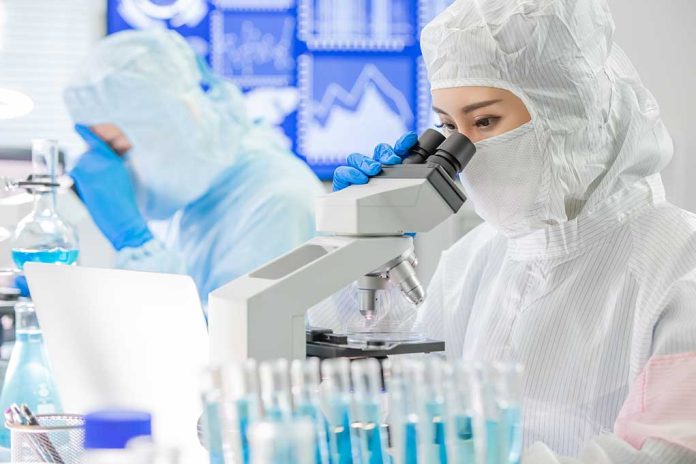
Federal authorities are cranking up the heat on a controversial Chinese-linked biotech lab in California, but what they discovered there will leave you questioning everything.
At a Glance
- Jia Bei Zhu and Zhaoyan Wang face additional charges of conspiracy and wire fraud.
- The biotech lab has been linked to violations concerning COVID-19 test kits.
- Federal and state investigations revealed unauthorized experimental activities and unsafe conditions.
- The case underscores the growing scrutiny of Chinese involvement in critical U.S. industries.
Heightened Legal Battle
Federal authorities have intensified their legal pursuit of Chinese nationals Jia Bei Zhu and Zhaoyan Wang, operators of a controversial biotech lab in Central California. The two face additional charges of conspiracy and wire fraud. The biolab has been linked to numerous violations, including distributing adulterated and misbranded COVID-19 test kits and making false statements about their identity and involvement.
Jia Bei Zhu and Zhaoyan Wang ran Universal Meditech Inc. (UMI) and Prestige Biotech Inc. (PBI) in Fresno and Reedley. From August 2020 to March 2023, they conspired to mislead buyers by importing COVID-19 test kits from China and falsely representing them as made in the U.S. Furthermore, they falsely declared the COVID-19 test kits as pregnancy test kits to import them illegally.
The additional charges come after prior indictments against Zhu for fraudulently distributing COVID-19 test kits and making false statements. As Zhu faces trial, the saga exposes significant flaws in oversight and regulation within critical U.S. industries where foreign involvement plays a substantial role.
Zhu and Wang reportedly made over $1.7 million from their fraudulent activities. If convicted, they face up to 20 years in prison for conspiracy and wire fraud, plus additional years for distributing adulterated medical devices and lying to authorities.
Investigative Findings
In March 2023, city and state officials, along with the FBI, executed a search warrant and uncovered alarming evidence at the facility. Investigators found several hundred genetically modified mice designed to catch and carry COVID-19, kept in unsafe conditions. The CDC joined the investigation, identifying at least 20 potentially infectious agents stored under inadequate conditions, including HIV, E. coli, and malaria.
The lab lacked state or federal licenses or certifications for breeding and experimenting on these mice. The CDC’s inspection confirmed the presence of dangerous pathogens, contradicting false statements given by the lab’s representatives.
Federal authorities file additional charges against Chinese-linked biolab in Central California https://t.co/ZwxyBKpWlV
— Fox News (@FoxNews) August 15, 2024
Regulatory and National Security Concerns
The case has drawn significant attention from multiple levels of government and highlights the broader issues of regulatory compliance and national security risks. Chairman Brad Wenstrup (R-Ohio) initiated an investigation into the unlicensed activities of Prestige Biotech. His concerns echo those of many Americans who are increasingly alarmed at the unchecked activities of foreign entities on U.S. soil.
“On March 16, 2023, various City and Bureau officials executed a search warrant and found ‘several hundred mice that…have been genetically modified to catch and carry the COVID-19 virus.’ The mice were being kept in dangerous and unsafe conditions. The City stated, ‘[t]he tenant has been unable to provide evidence of any state or federal licenses or certifications that would permit the breeding and experimentation being conducted on these mice,’” Chairman Wenstrup wrote in his letter to the FBI.
The evidence uncovered so far points to severe lapses in safety protocols, regulatory compliance, and possible national security risks. This case exemplifies the dangerous gaps in oversight when it comes to foreign-linked enterprises operating in critical areas of biotechnology and medical research in the United States.
An illegal Chinese-linked biomedical lab was discovered in California…
This should alarm every American. https://t.co/oDCfExjvvL
— Brian Babin (@RepBrianBabin) August 5, 2023
Broader Implications
The escalating legal actions against the Chinese-linked biotech lab in California serve as a stark reminder of the vulnerabilities that exist within our regulatory systems. It’s troubling that infectious agents such as Chlamydia trachomatis, E. coli, HIV, Malaria, and SARS-CoV-2 were mishandled within our borders. Local, state, and federal agencies had to work for several weeks to remove the highly dangerous materials safely.
The saga is far from over, and the implications it brings to the forefront are critical to understand and address. As more information comes to light, and as the September 2024 trial date for Zhu approaches, one has to wonder how many other foreign-linked labs operate with the same level of nonchalance towards both safety and the law. The time for stringent oversight has never been more urgent.






















